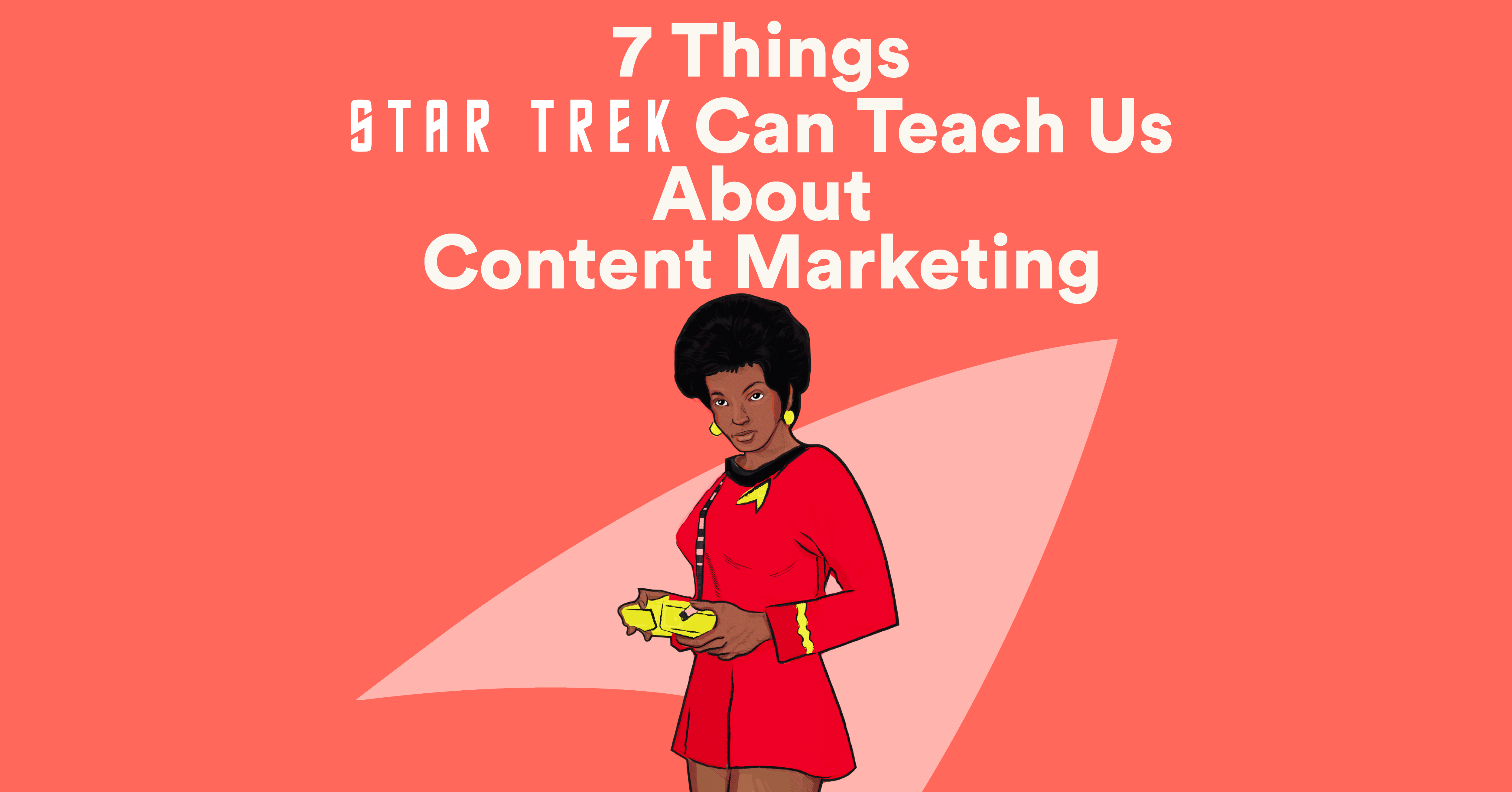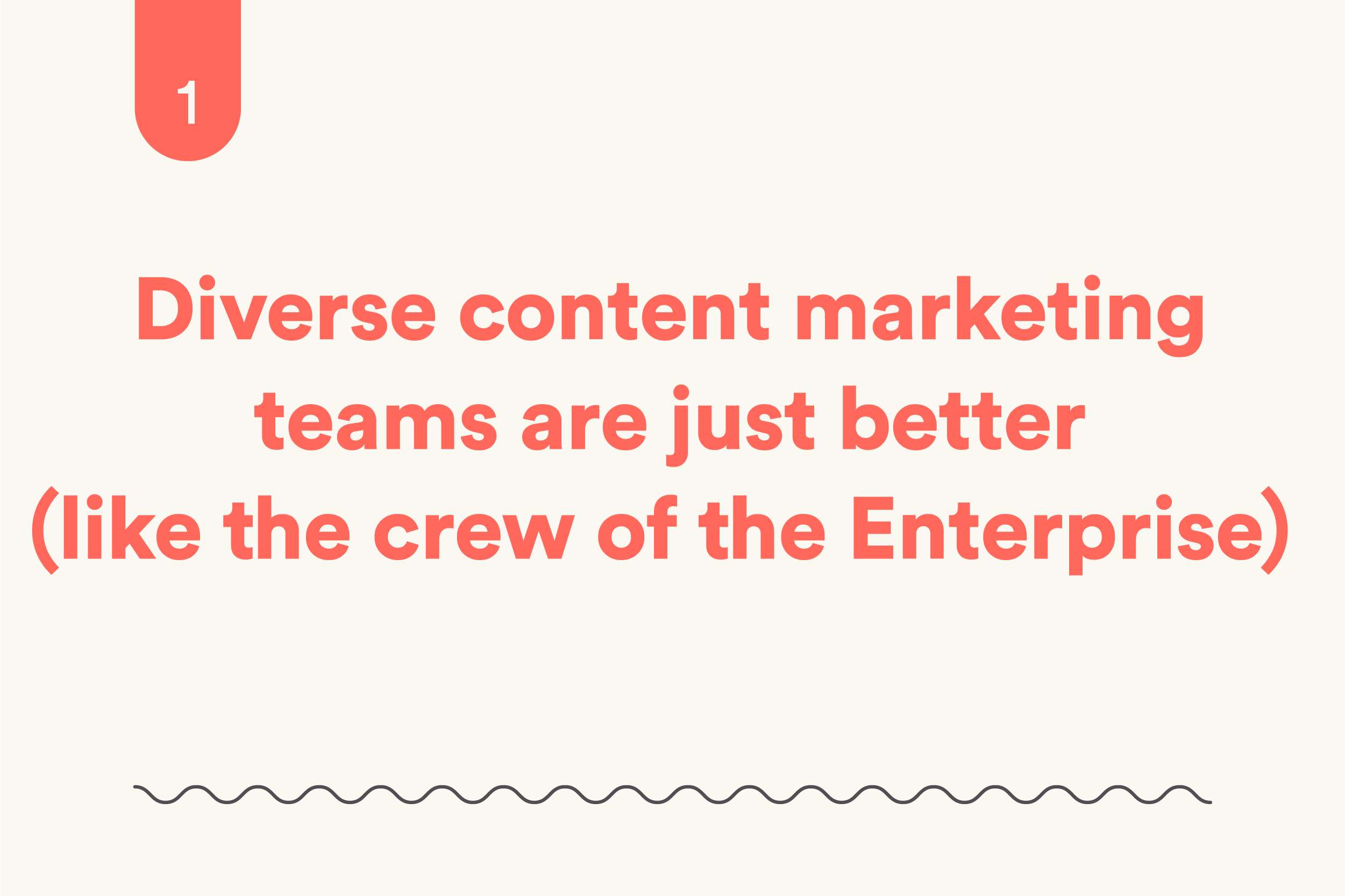I was raised by two absolute nerds.
I am a proud nerd.
I now look back and am super grateful for my upbringing because I somehow figured out how to be a “cool nerd” in high school. I played sports, led the student government, and did fairly well academically (my subjects of choice were English and History).
This has served me well in life as popular culture now seems more or less dominated by cool nerds.
My Dad Ken loved National Geographic. I would sit on his lap in our big comfy La-Z-Boy chair and read the latest editions with him during the evenings. We’d look at pictures of faraway places and exotic animals. We’d dream of getting on a plane and seeing it for ourselves one day.
This is where I get my wanderlust.
My Dad Paul (yep, I grew up with gay parents + two Daddios) loves Star Trek. We’d sit on the couch together watching the latest episodes of Star Trek: The Next Generation.
We’d marvel at the advanced technology and I’d ask a million questions about how space travel worked. My Dad Paul would embarrass me every Halloween by dressing up as Data the android and talking in a robotic voice to everyone who ventured into our family corner store.
I was mortified every year! My Dad was suuuuuuch a nerd!
We ended up going to lots of Star Trek conventions. The big draw at these conventions is the chance to meet the cast. I must’ve met the entire cast of the original series as well as the subsequent shows by the time I was 10 years old.
One of my fondest childhood memories came from one of those conventions when I was about 8 years old. The story goes like this…
One fateful convention day, we had our chance to meet Nichelle Nichols, the incredible star who played Lieutenant Uhura on the original Star Trek series in the 1960s and 1970s.
She is a stunningly beautiful Black woman who was friends with Martin Luther King, Jr. The story goes that he convinced her to stay on the show because he loved the example she was setting for Black women and girls.
She was one-half of the first interracial kiss on primetime TV in the US (between her and Captain Kirk no less!).
Picture this scene: You’re Nichelle Nichols, a Black legend of stage and screen. And up walks a little Black boy with his sassy white gay father. The father-son duo are both wearing Star Trek gear and absolutely goo-goo-eyed to see you. What a hoot!
In any case, Ms. Nichols absolutely loved us as a pair and gave me a big hug and a big wet kiss on my little cheeks. Before saying goodbye to us, she gave me a special framed photograph (signed, of course) of her reclining seductively on a couch with a feather boa wrapped around her.
That photo hung in my childhood room for years! I treasured it so much.
As I look back on those awkward years, I’ve come to learn how much growing up as a Trekkie truly shaped me and how I see the world.
What a gift it was to grow up immersed in a fantasy about diverse groups of humans and other sentient beings putting aside petty differences and working together in harmonious collaboration for the betterment of themselves and their intergalactic society.
This led me to thinking…what lessons does the Star Trek universe have for those of us in content marketing?
Let’s beam ourselves up to the mothership to find out.
Content Marketing Lessons From The Star Trek Universe
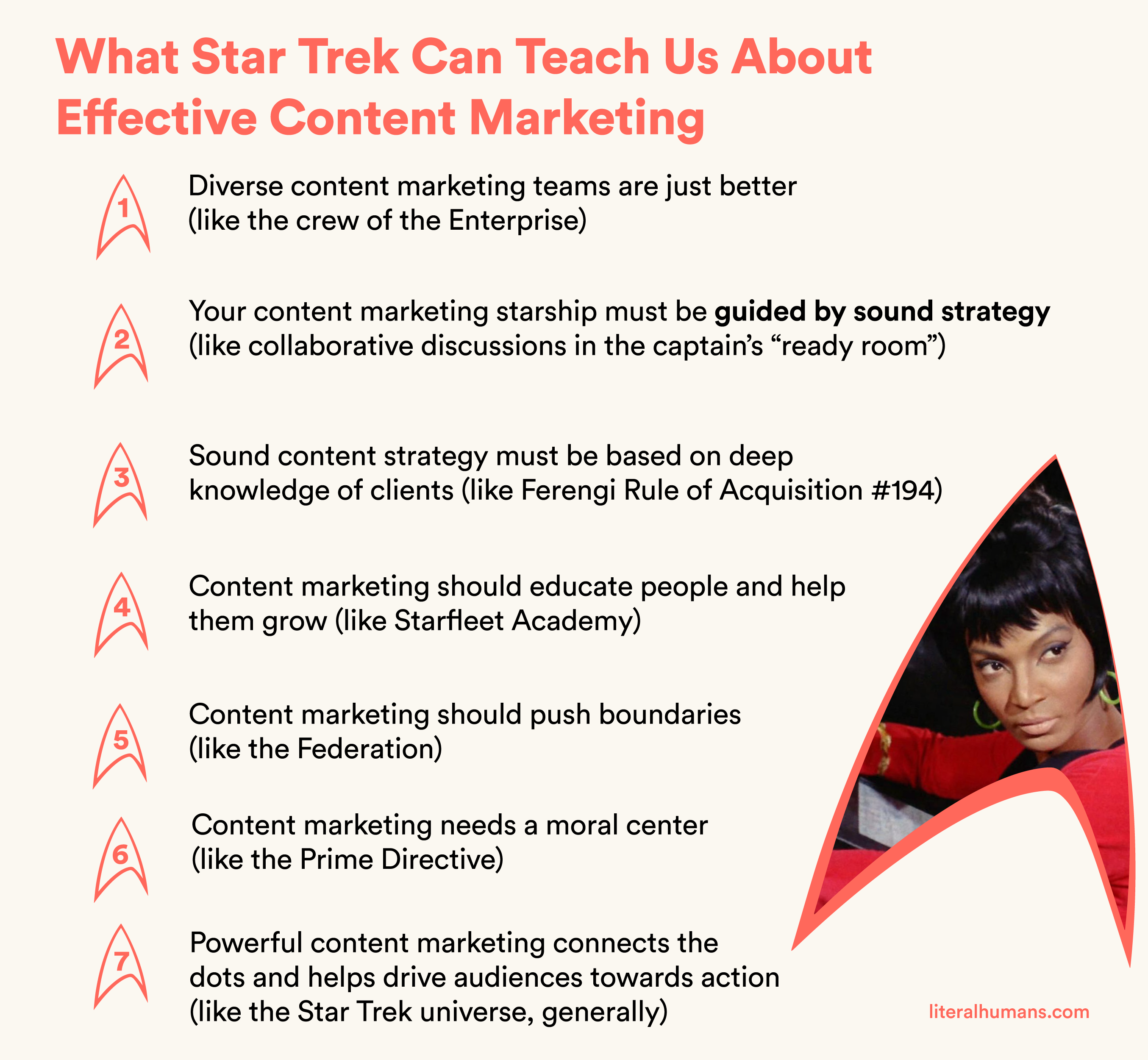
1. Diverse content marketing teams are just better (like the crew of the Enterprise)
Just look at the bridge of the Enterprise. It’s full of different races, genders, religions, and even extraterrestrial species!
That’s the whole premise of The Federation–an intergalactic alliance of beings of all shapes and sizes that, together, is stronger than they would be apart.
The consistent thread throughout Star Trek is that of a united Federation battling against violent, greedy, xenophobic species that prefer to fight for dominance over territory in space rather than kindly sharing the universe.
But the Federation exists to prove that there’s a better way. Its success proves the African proverb: “If you want to go fast, go alone. If you want to go far, go together.”
So yes, by all means, take a long hard look at the team you’ve got running your content marketing. Then ask yourself:
- Do they represent the (likely/hopefully) diverse audiences your clients are targeting?
- Are they leveraging multiple backgrounds to make your clients’ content more creative?
- Can they enrich your clients’ brand identities through their mosaic lived experiences?
If not, then what are you doing with a non-diverse, homogenous content marketing team?
The answer: Significantly less than you could be doing with a truly diverse content team.
The choice is yours, Captain.
2. Your content marketing starship must be guided by sound strategy (like collaborative discussions in the captain’s “ready room”).
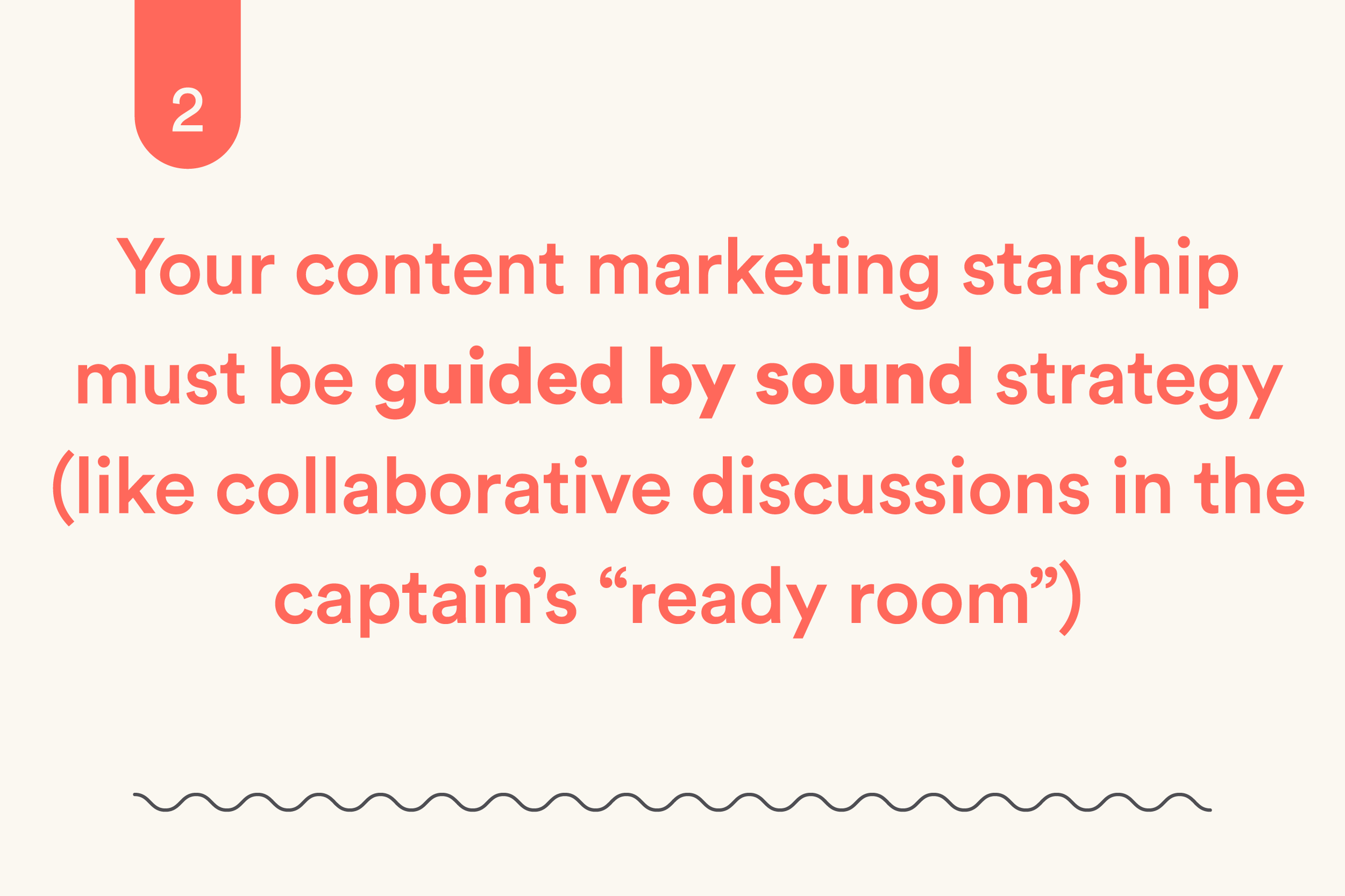
Yes, the buck stops with the Captain.
But you rarely saw a Star Trek captain developing strategy in a vacuum. The shows and movies were rife with extended consultations with various crew members.
Kirk discussing engineering issues with Scotty.
Will Riker challenging Picard on battle strategy.
Chakotay and Janeway getting into it over crew morale.
The same goes for strategy development in the context of content marketing. If you’ve got a client like Playbook (whose customers are designers), you’d better bring your design team into those strategy discussions (we did!).
If your clients Formation Ventures and Boost are looking to engage Gen Z audiences, it makes good sense to vet design ideas with Zoomers (we did!).
Great content captains understand that they don’t have all the answers and they know exactly who to pull into the “ready room” (sort of like the captain’s Oval Office) to build a more effective content strategy.
This demands a collaborative approach, informed by data, infused with creative thinking, and hyper-focused on your clients’ goals.
3. Sound content strategy must be based on deep knowledge of clients and subject matter expertise (like the Ferengi)

Let’s face it, content marketing is a deeply competitive industry.
If you’re not making traffic gains for clients and catalyzing conversions, you’ll have trouble sticking around for long. It takes some business cunning to hack it in digital marketing.
Enter the Ferengi.
The Ferengi are a hyper-capitalist humanoid race from Ferenginar, in the Alpha Quadrant. Despite some glaring flaws, they’re some of the best business people in the galaxy.
Their transactions are governed by the Ferengi Rules of Acquisition, a set of sacred precepts that shape their society. While many of the rules are deeply problematic from an ethical business standpoint, a few stand out as helpful guideposts for marketers.
Take Ferengi Rule of Acquisition #194: “It’s always good business to know about new customers before they walk in the door.”
How can marketers put this particular Ferengi rule into practice? A few ways:
- Get some baseline performance data on your client’s marketing efforts before the first sales call (use SEMRush or Ahrefs)
- Research their competitors (and their content) as well as their overall market segment
- Come to the table with some initial, creative ideas for marketing campaigns
- Dazzle them with personalized proposals that focus on their unique needs
- Take the first month of the engagement to do a deep dive into research that will shape a better content strategy (this includes website audits, social media audits, and other in-depth analyses)
In short, do your homework. Your clients will thank you.
4. Content marketing should educate people and help them grow (like Starfleet Academy)
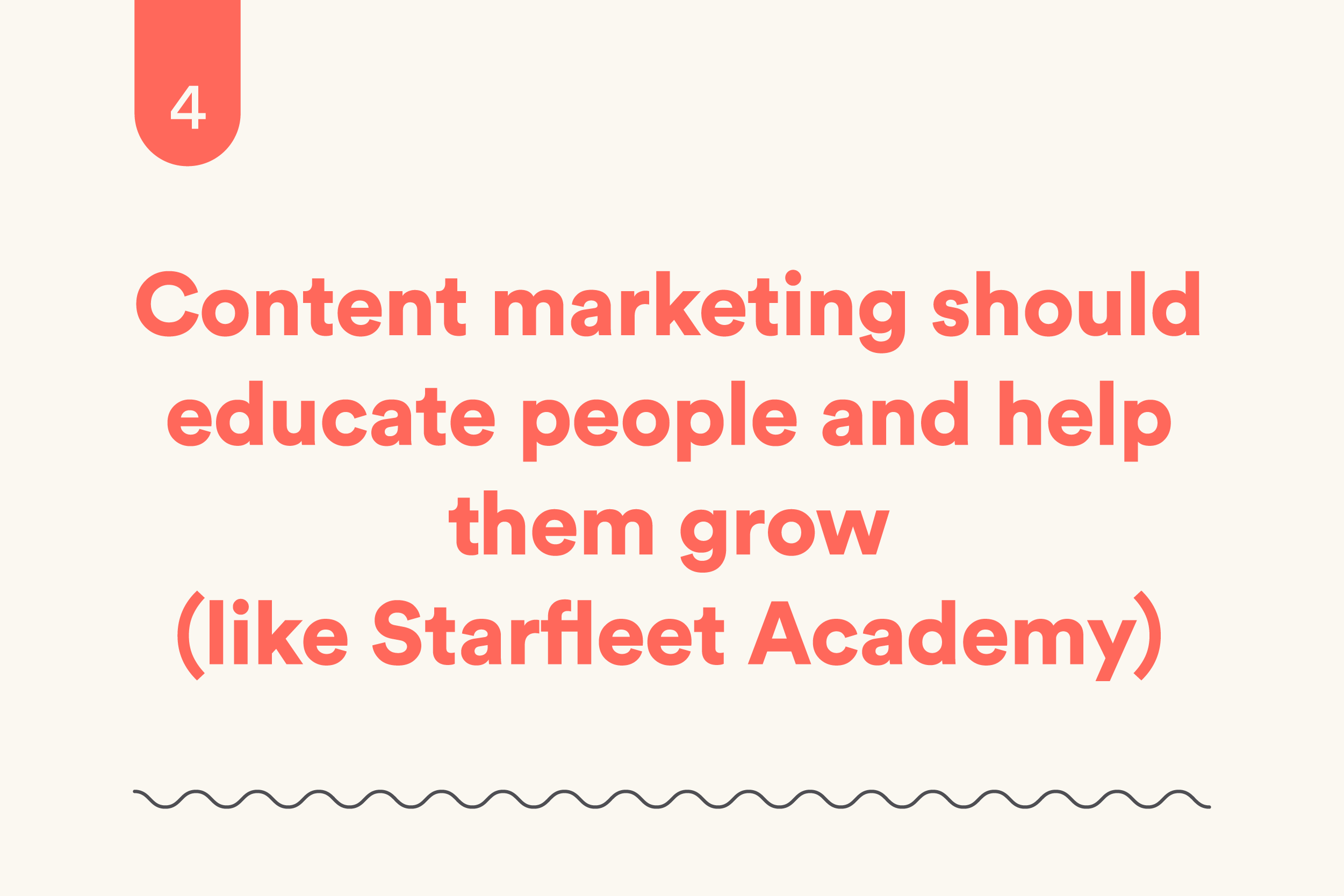
At NASA, they called it “The Right Stuff.”
It’s that special mix of aptitude and expertise necessary to send our race to the stars. But that cocktail of brains and brawn has to come from somewhere.
In short, behind every world class Starfleet is a state-of-the-art educational endeavour.
Enter Starfleet Academy.
The institution’s motto is “Ex Astris, Scientia” or “From the stars, knowledge.”
At their core, content marketers are the educators of the internet. (In fact, having worked as a teacher in a past life has served me remarkably well in my content marketing career.)
Great content marketers synthesize large amounts of knowledge into digestible pieces for audiences.
They think deeply about how to “scaffold” information to promote understanding and action within ideal customer segments.
In essence, any top-notch content marketing operation is a learning organization that:
- Operates with a shared vision on how to help clients achieve their business goals
- Thinks systemically about content strategy (e.g. linking paid and organic tactics)
- Emphasizes team learning (e.g. Moz Academy)
- Encourages personal mastery (e.g. Ahrefs’ Blogging for Business course)
- Builds high-performing mental models for their clients’ audiences (e.g. Hubspot’s pillar and cluster model)
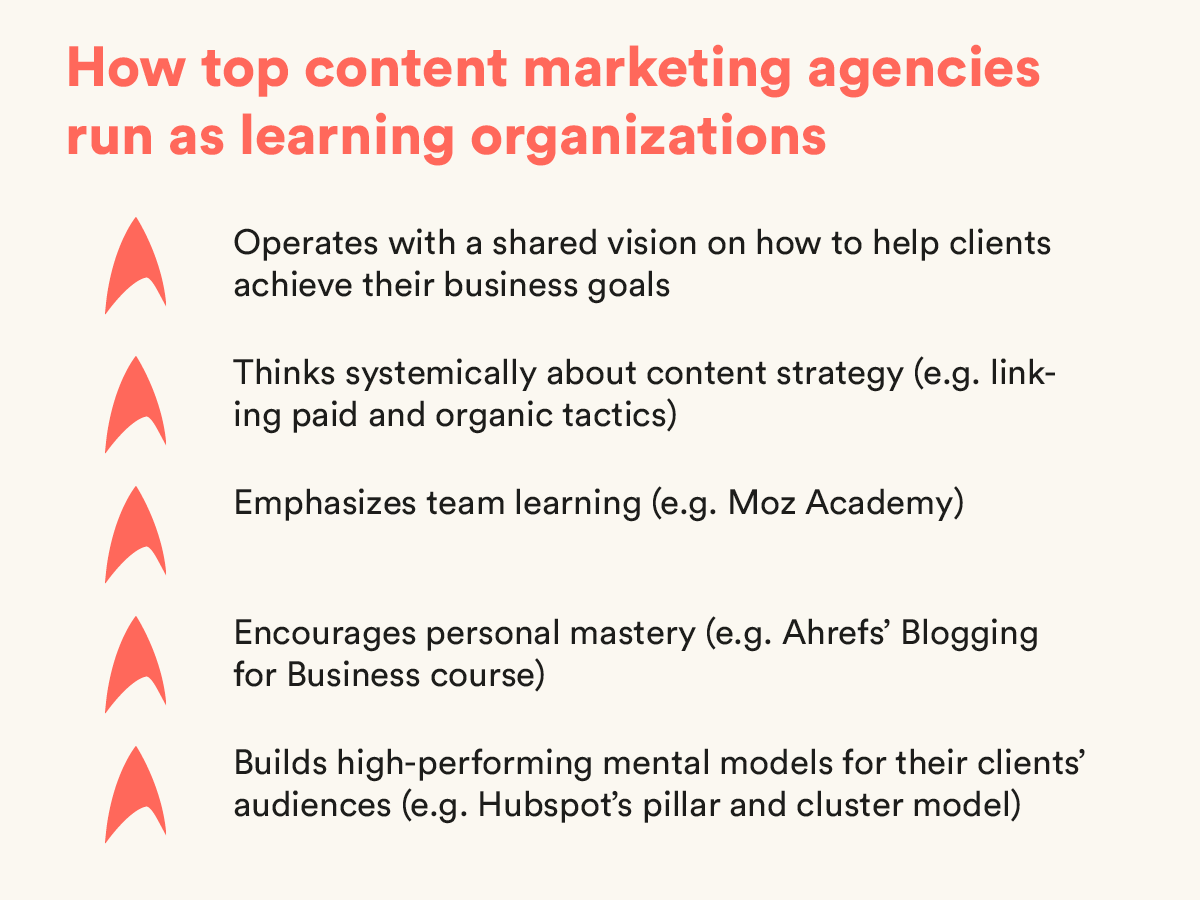
It’s not easy to build this type of business and it’s even harder to maintain it, I’d argue.
But it’s important to have an educational North Star for both your internal and external content marketing operations.
5. Content marketing should push boundaries (like the Federation)

There’s a reason that the skyscraper technique is foundational to content marketing.
That reason is added value.
What do I mean by that?
I mean that content marketers should always search for ways to provide new and valuable information for their clients’ audiences. That’s what keeps those audiences engaged. It’s what drives them towards converting.
But finding the path to that little extra isn’t always simple. It takes lots of thoughtful research, strategic planning, and careful execution.
Like any good marketing project, there’s a chance it could fail.
That blog post doesn’t drive new traffic. The social media creative doesn’t elicit engagement. A whole quarter’s worth of strategy that fails to bring in new conversions.
Just like the famous line from Captain Kirk, in marketing, “risk is our business.”
That’s the essence of The Federation, an interstellar union focused on furthering the universal rights of sentient beings across the galaxy. Talk about a risky endeavor!
If I’m being cheeky (and I usually am), I like to think of our hybrid agency as a microcosm of The Federation. A constellation of diverse and talented individuals coming together for a unified effort: Developing and deploying content that helps our clients reach their goals!
Clients trust us to take calculated, creative risks to help them grow their reach. In many ways, marketing is the bleeding, leading edge of any company.
(Perhaps that’s why it’s often the first budget to get cut! 🤣)
Every time a business sticks its neck out in the world to market its goods, there’s a chance that those efforts could fall flat. But the greater risk is always that the business stands still, stagnates, and doesn’t continue to grow.
This is where Captain Kirk might suggest: “The possibility, the potential, for knowledge and advancement is equally great.”
And he’s right.
This is why we market.
6. Content marketing needs a moral center (like the Prime Directive)

As content marketers, Google is basically our God.
Whether we like to admit it or not, we all worship at the altar of its algorithm.
We’re riveted by its every move. We’re collectively enthralled by the idea of getting our clients to that coveted top slot in the SERPs.
Famously, Google’s old motto used to be (the now-deeply ironic quip): “Don’t be evil.”
While Google has undoubtedly abandoned its former motto, I’d wager that content marketers should still hold fast to this aspirational adage.
In the Star Trek universe, we’ve got the Prime Directive.
Basically, “don’t interfere with other cultures and civilizations.” (Remember that Gene Roddenberry, Star Trek’s creator, was writing during the United States’ war of aggression in Vietnam).
Scanning the content marketing universe, it’s easy to find unethical black-hat SEO tactics as well as highly-questionable content strategy advice.
In short, be the anti-Nike and just don’t do it.
Instead, I might suggest a Prime Directive for the denizens of the content marketing Federation: Tell the truth and add value.
It’s not always that simple, but most of the time, it actually is.
7. Powerful content marketing connects the dots and helps drive audiences towards action (like the Star Trek universe, generally)
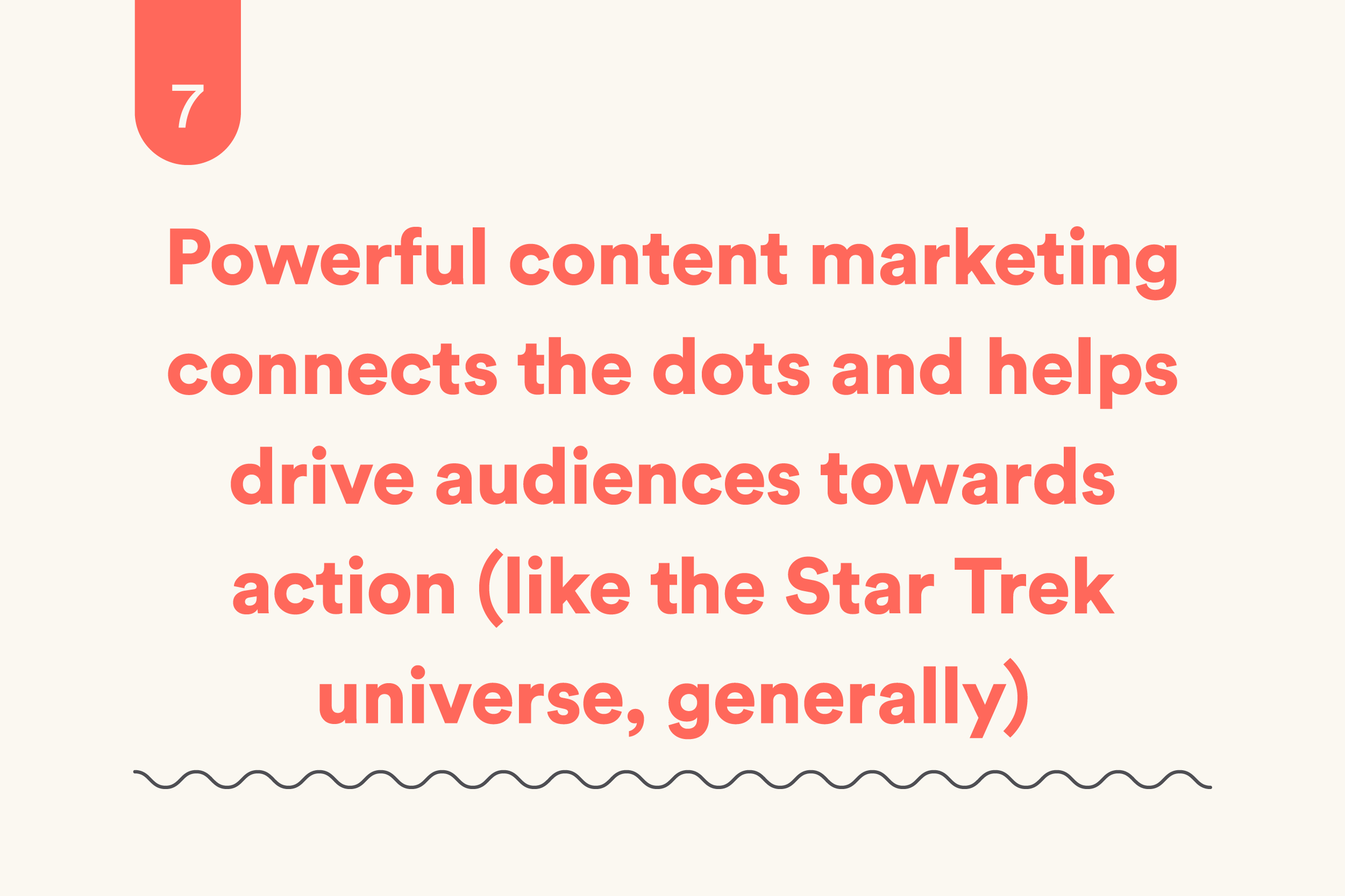
One of the best things about the Star Trek TV series: Each episode has its own focused plot that can virtually standalone while still connecting back to a larger narrative.
The original series is its own universe but it’s still connected to Deep Space Nine, The Next Generation, Voyager, and the other spin-off shows and movies.
Connecting the dots between them is half the fun of being a true Trekkie!
This isn’t too different from the topic cluster and pillar page strategy popularized by our friends at HubSpot.
Ensuring that each topic cluster is robust with high-quality and unique content ideas while effectively linking to larger pillar pages is what deepens your audiences’ investment in your brand.
Just like Gene Roddenberry did, you’re building a world for your clients’ audiences.
It’s why Star Trek has some incredible staying power, now seven decades after its inception.
It’s the ultimate sticky brand.
How To Build A Content Marketing Starship
If you asked me seven years ago, I wouldn’t have dreamed I’d be launching a successful content marketing agency in London, the world’s third largest startup ecosystem.
(I probably would’ve had a hard time giving you a solid definition of content marketing!)
Yet here I am, finding wisdom from my favorite childhood TV show to help guide our agency.
From building a diverse team and developing content strategy collaboratively to deepening our client knowledge whilst structuring a learning organization, I’ve honestly been astounded by how possible this improbable journey has been.
This isn’t some Molly Mae “everyone has the same 24 hours” bullshit.
Just some humble wisdom from a still relatively young(-ish 👴) agency owner reflecting on the pillars that helped us get off the ground.
It’s been an absolute pleasure to get up everyday and produce creative content anchored in a moral center: telling the truth and adding value. (Hence our focus on tech for good.)
My sincere hope for every content marketer: May you (and your content marketing efforts) Live Long and Prosper! 🖖

